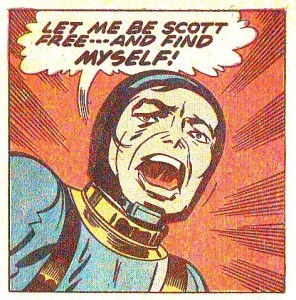Matt Brady left a stirring defense of Jack Kirby on Domingos’ recent post. I thought I’d highlight it here.
I love, love, love me some Kirby, and “Himon!” is one of my all-time favorite comics stories (it’s the one I wrote about in the Team Cul de Sac zine), so I feel like I’ve gotta argue against this piece somehow, but I doubt anything I say will have much impact or change anybody’s mind. Still! I feel like every argument against the King here is a reason I like his work so much, and I see complexities and fascinating art where Domingos sees loud, violent simplicity. The take on good and evil might be black and white, but there’s depth to it, a reflection of how Kirby saw the world. Darkseid is more than just an evil dictator, he’s THE dictator, the very face of Fascism, wanting to subjugate and control everyone and everything. Mister Miracle is Kirby himself, learning to live through oppression and escape to inspire others, and his love for Barda is what keeps him going. Orion (a counterexample to the good=pretty, bad=ugly divide, given that he hides his Apokaliptian visage behind a Mother Box-created facade) is the warrior struggling to use his power for good and fight the evil that spawned him. Yes, it’s all loud, brash, explosive, but it’s pitched at the level that suits the conflicts, stirring the heart with the primal battles of good and evil.
And there’s more depth in the use of violence too. A scene in which Orion loses control and savagely beats an evil fiend to death while laughing maniacally is powerful in its evocation of the way the urge to violence can be seductive. In “The Death Wish of Terrible Turpin!”, a regular human gets in the middle of a fight between Orion and another New God, and he is nearly beaten to a pulp, the damage to his frail body evident and monstrous, a horrible reminder of the way war chews people up and spits them out. This stuff isn’t just punches and explosions for kicks; Kirby examined the meaning behind his bombast and made us feel it on an emotional level as well as a visceral one.
Even the glorification of technology is far from universal; most of Kirby’s cosmic machines were impossibly huge contraptions that loomed over characters and landscapes, frighteningly incomprehensible in their functions. As much as he might have reveled in the coolness of futuristic machinery, Kirby demonstrated how it can and will be used for control and death.
I dunno, I hope Charles Hatfield or somebody will show up and mount a better defense of this stuff than I can. I agree that most superhero comics can be dismissed as “corporate-owned dreck”, but not Kirby. He’s got so much more going on than black and white morality, simplistic characters, technological fetishism, and glorification of violence. I might not be able to do it very well, but I’ll defend him to my dying day.
__________
Click here for the Anniversary Index of Hate.

